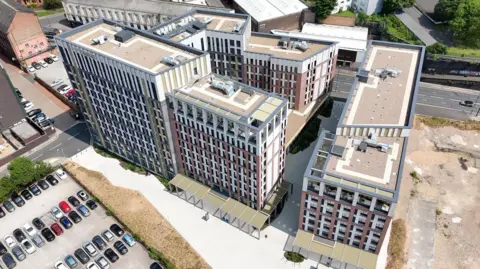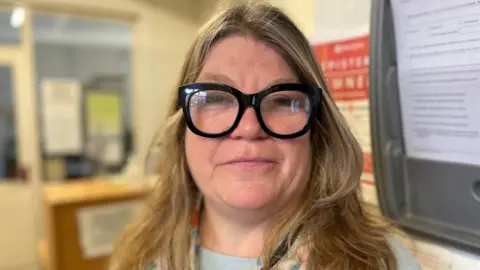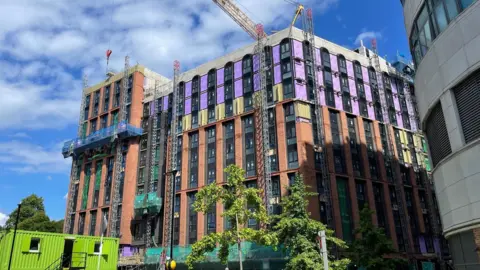How new student flats are changing city skyline
 BBC/Caroline Lowbridge
BBC/Caroline LowbridgeWalk towards the centre of Nottingham and you will no doubt witness how new student accommodation is changing the city's skyline.
And the scale of that continuing development has been revealed after new data showed Nottingham City Council has approved 60 purpose-built student developments in the last decade.
The blocks approved represent a total of 9,000 bed spaces, according to a Freedom of Information (FOI) request by the BBC to the council, and aim to open up more traditional family homes to residents in Nottingham.
The growth of student blocks in the city centre has led to a divide, with claims it has led to a rise in rent for residents.
"Shared houses are a no-no, because the more people, the more mess they make," said Nottingham Trent masters student Himanshi Nikhare.
However, recent graduate Phoenix May thinks the city has too much new student accommodation.
"I liked being in a [shared] house because you didn't feel isolated," she said.

Meanwhile, Bobby Richter, a postgraduate student at the University of Nottingham, says living in a purpose-built block in the city centre gives him more time to study.
"We have activities there so we don't need to go out, but I would rather be living by myself because it costs the same amount of money if I rent my own flat," he said.
According to the FOI request, three developments were approved in the 2015 calendar year, followed by four in 2016, five in 2017, six in 2018 and seven in 2019.
In 2020, a further five purpose-built developments were approved by the city council, with six following in 2021, eight in 2022 and seven in 2023.
The 2024 calendar year saw the most developments granted in the 10-year period, with nine given the green light.
'Balance not right'
Some individuals told the BBC the new student blocks are helping to bring life to the city centre and creating communities.
Though that view is not shared by all.
Resident Rick Hall said: "You've got a massive expansion of student accommodation.
"On the other hand you've got a crisis of homelessness - that would seem to indicate that the balance isn't right."
Alison Kelly, 50, who has been staying at the London Road hostel since becoming homeless, said: "What they're offering students is perfect for me, a little studio flat would be perfect.
"Why not make them for other people as well?"
Nottingham resident Liam Gunn says the number of student properties created around Canning Circus is forcing him and his children out of the area.
He said: "I'm paying £1,200 for a two-bed flat, and it's absolutely tiny, I could get bigger student accommodation.
"It's horrible. I'm just going to view a house now and I've got to go 10 miles away from work in the city centre."
Nottingham City Council says university students are a crucial part of the city's economy, but rising numbers meant too many family homes in areas such as Lenton were being converted into house shares.
Director of transport and planning Paul Seddon believes encouraging purpose-built student developments has helped protect scarce housing stock for local people to rent.
"What we've managed to do in Nottingham over the last decade is avoid the situation other university cities had where students simply haven't been able to find any accommodation," he explained.
"If those student blocks had not been built, the pressure on the local housing market would have been even more extreme than it has, and that inevitably would have pushed rents up even further."

Sally Denton, a housing adviser at the Nottingham Law Centre, said: "There is a massive pressure on accommodation and that has driven up rent in the private sector.
"It's causing resentment.
"There is a lot of private sector accommodation that isn't affordable, particularly for people on low income or people whose income is supplemented by some benefits.
"It's just not a great look for somebody in bed and breakfast accommodation, who is being told there isn't suitable accommodation available for them, to see properties repeatedly built that's not available for them."

The city council said purpose-built developments had largely kept pace with increasing student numbers over the last decade.
Seddon said that had started to reduce the number of house shares and he predicted a further easing of pressure on residential housing as student numbers began to fall.
He added some student accommodation providers now offered more competitive rents as they struggled to fill rooms, including incentives.
He believes some blocks could be adapted for non-student use within the next 18 months and his team is already speaking to providers with significant vacancy rates.
"Some of the blocks are more readily convertible. If they're smaller, if they're more akin to apartment living, then those will be more readily able to convert," he said.
"Are we building something that can only ever be student accommodation? Well the answer is a strong 'no' from me."

Follow BBC Nottingham on Facebook, on X, or on Instagram. Send your story ideas to [email protected] or via WhatsApp on 0808 100 2210.
